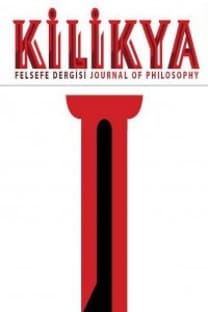Pyrrhus ile Cineas’ta Tasarı ve Aşkınlık Temelinde Simone De Beauvoir’ın Carpe Diem Eleştirisi
Tasarı ve aşkınlık, Simone de Beauvoir’ın varoluşçu felsefesinin önemli kavramlarıdır. Beauvoir’ın tasarı ve aşkınlık kavramları onun ilk felsefi yapıtı olan Pyrrhus ile Cineas’ta ileri sürülmüştür. Bu makalede Beauvoir’ın tasarı ve aşkınlık kavramlarını carpe diem düşüncesinin karşısına koyarak nasıl kurduğunu sunmak istiyorum. Bu kavramların onun temel ontolojik argümanının temellerini oluşturduğu iddia edilmiştir. Bu ontolojiye göre insan olmak aşkın olmak demektir, aşkınlık somut tarihsel durumlar içindeki tasarılara bağımlıdır. Hiçbir insan bu temel ontolojik durumdan kaçamaz. Carpe diem düşüncesi ya da herhangi bir dingincilik kuramı bu temel ontolojik gerçeklikle çelişir ve bu yüzden de Beauvoir tarafından eleştirilir.
Anahtar Kelimeler:
Simone de Beauvoir, varoluşçuluk, tasarı, aşkınlık, keyif, Carpe Diem
Simone De Beauvoir’s Critique of Carpe Diem, on the Basis of Project and Transcendence in Pyrrhus and Cineas
Project and transcendence are important concepts in Simone de Beauvoir’s existentialist philosophy. Beauvoir’s concepts of project and transcendence are introduced in Pyrrhus and Cineas, her first philosophical work. In this article I would like to present how Beauvoir constructs the concepts of project and transcendence against the idea of carpe diem. It is argued that these concepts constitute the basis of her fundamental ontological argument. According to this ontology, being human means being transcendent, transcendence is dependent on the projects in concrete historical situations. No human being could escape this basic ontological situation. Idea of carpe diem or any theory of quietism contradicts with this basic ontological fact and for this reason it is criticized by Beauvoir.
Keywords:
Simone de Beauvoir, existentialism, project, transcendence, enjoyment, Carpe Diem,
___
- Carpe Diem. (2019). Encyclopedia Britannica içinde. Erişim adresi https://www.britannica.com/topic/carpe-diem#ref1248932.
- Arp, K. (2017). ‘Pyrrhus and Cineas’: The Conditions of a Meaningful Life. L. Hengehold & N. Bauer (Ed.), A Companion to Simone de Beauvoir içinde (ss. 273-285). Hoboken: Wiley. Doi: 10.1002/9781118795996.ch22
- Beauvoir, S. (1948). The Ethics of Ambugity. New York: Kensington Publishing.
- Beauvoir, S. (2004). Pyrrhus and Cineas (1944). M. A. Simons (Ed.), Philosophical Writings içinde (ss. 77-150). Urbana & Chicago: University of Illinois Press.
- Bergoffen, D. (2018). Simone de Beauvoir. E. N. Zalta (Ed.), The Stanford Encyclopedia of Philosophy içinde. Erişim adresi https://plato.stanford.edu/archives/fall2018/entries/beauvoir
- Ferry, L. (2008). Gençler İçin Batı Felsefesi (D. Çetinkasap, Çev.). İstanbul: Türkiye İş Bankası Kültür Yayınları.
- Moser, S. (2008). Freedom and Recognition in the Work of Simone de Beauvoir. Frankfurt: Peter Lang.
- Musset, S. (t.b.). Simone de Beauvoir. The Internet Encyclopedia of Philosophy içinde. Erişim tarihi 8 Mayıs 2019, Erişim adresi https://www.iep.utm.edu/beauvoir
- Navia, L. E. (1998). Diogenes of Sinope: The Man in the Tub. Westport: Greenwood Press.
- O’Keefe, T. (t.b.). Epicurus. The Internet Encyclopedia of Philosophy içinde. Erişim tarihi 10 Mayıs 2019, Erişim adresi https://www.iep.utm.edu/epicur/#H5
- Sandford, S. (2006). How to Read Beauvoir. Londra: Grenta Books.
- Shakespeare, W. (1998). Onikinci Gece (Ö. Nutku, Çev.). İstanbul: Remzi Kitabevi.
- Veltman, A. (2006). Transcendence and Immanence in The Ethics of Simone de Beauvoir. M. A. Simons (Ed.), The Philosophy of Simone de Beauvoir: Critical Essays içinde (ss. 113-131). Bloomington: Indiana University Press.
- Veltman, A. (2009). The Concept of Transcendence in Beauvoir and Sartre. C. Daigle & J. Golomb (Ed.), Beauvoir and Sartre: The Riddle of Influence içinde (ss. 222-241). Bloomington: Indiana University Press.
- Webber, J. (2018). Beauvoir and The Meaning of Life. S. Leach & J. Tortaglia (Ed.), The Meaning of Life and the Great Philosophers içinde (ss. 224-231). New York: Routledge. Doi: 10.4324/9781315385945
- Yayın Aralığı: Yılda 2 Sayı
- Başlangıç: 2014
- Yayıncı: Eray Yağanak
Sayıdaki Diğer Makaleler
Doğrudan Çıkarımlardaki Bazı Mantıksal Eşdeğerlik İlişkileri
İnsan, İnsancıllık (Hümanizm) ve İnsan Hakları: İnsancıllık Eleştirisi Üzerine
Kant’ın Opus Postumum Adlı Yapıtında Geçiş Sorunu
Tıp Etiğinden Bio-Etiğe: Fritz Jahr
Kierkegaard’nun Öznel-Nesnel Hakikat Ayrımı Temelinde Tekil Birey Anlayışı
Anlamın Doğası ve Ruhbilimselci Yaklaşım Sorunu
İnsan Etkinliğinin Doğası: Arendt’in Marx Üzerine Görüşlerinin Eleştirel Bir Değerlendirmesi
Wittgenstein’ın Birinci Dönem Düşüncelerindeki Resim Kuramı ve Anlamla İlgili Sorunlar
G. W. F. Hegel’in Estetik Üzerine Dersleri ve Sanatın Sonuna İlişkin Tezler
